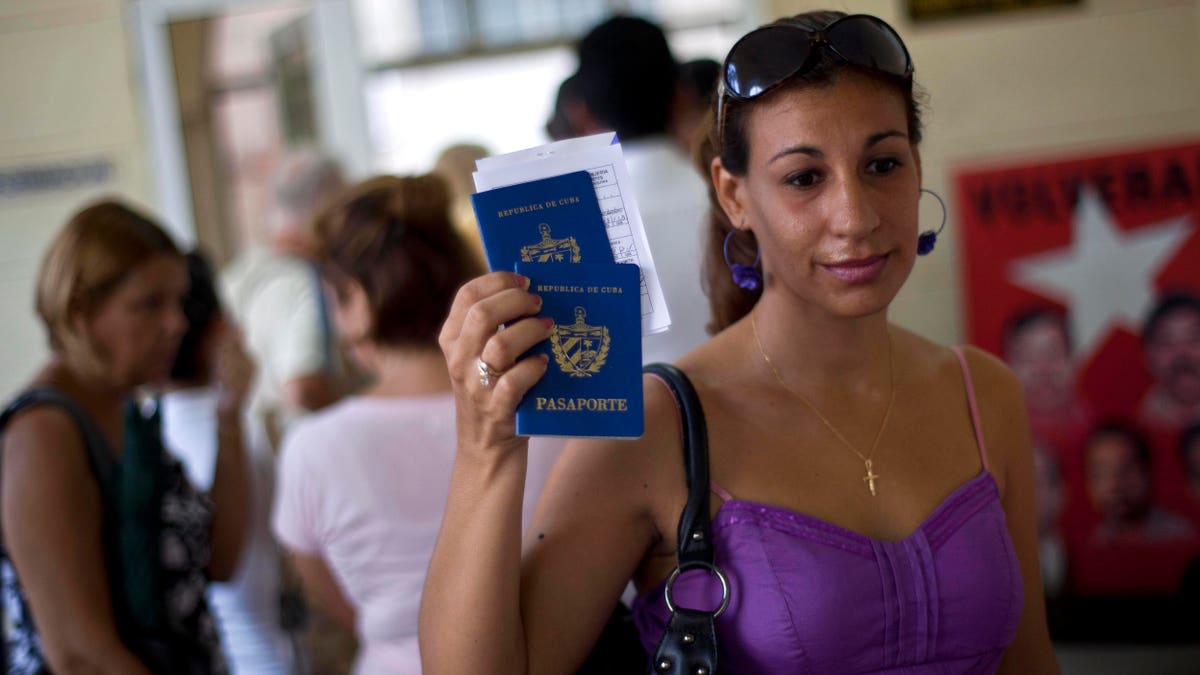
A woman shows her passport and that of her son to reporters as she leaves an immigration office in Havana, Cuba, Tuesday, Oct 16, 2012. (AP2012)
HAVANA – While Cubans cautiously celebrated Tuesday’s announcement on the ease of travel restrictions out of the island, the news has also raised suspicion and concerns over a possible mass exodus.
But the fact of the matter is Raúl Castro’s surprise decree doesn't mean Cubans will be able to book tickets on commercial planes and head for Miami or wherever they want. They will need passports, and the government will retain final say on who gets them.
According to the decree published on Granma, the official newspaper of the Cuban Communist Party, supervisors must approve the issuance of passports to government and military officials, professionals, physicians and other medical personnel, top sports figures and others whose work is deemed “vital” to the state.
Passports also can be denied to any Cuban “when it is so determined by the appropriate authorities for other reasons of public interest,” the decree added, or when “reasons of defense and national security suggest it.”
“If that’s the way it is, then I have to believe that the government will be as arbitrary as always,” said Wilfredo Vallín, head of the non-government Cuban Judicial Association to the Miami Herald.
Also barred from obtaining passports — whose price rose from about $60 to about $110 — are those who are subject to the military draft or have other unspecified “obligations” to the government, said the Herald.
Also, if the U.S. is their destination, would-be immigrants and tourists will still need permission from the U.S. government to enter the country legally. With a multiyear wait for a visa, the average Cuban may not be leaving home any time soon.
"This may end up being ado about nothing," said a Cuban-immigration expert, Jose Azel of the University of Miami's Institute for Cuban and Cuban American Studies.
A State Department spokeswoman, Victoria Nuland, said Tuesday that the U.S. welcomes "any reforms that'll allow Cubans to depart from and return to their country freely. We remain committed to the migration accords under which our two countries support and promote safe, legal and orderly migration. Our own visa requirements remain unchanged."
Under those 1994 accords, Washington agreed to stop allowing Cubans caught at sea to enter the U.S. In 1995 the U.S. government began its "wet-foot, dry-foot" policy that allows anyone who makes it to shore to stay, while those caught at sea are turned back.
Since then, thousands of Cubans who made the treacherous trip across the Straits of Florida have been rewarded with entry into the United States. Unlike illegal immigrants from almost any other country, most Cubans not only can stay but also seek legal residency and eventually citizenship.
The welcoming policy isn't just for Cubans who arrive by sea. In recent years, thousands of would-be immigrants have opted to hire smugglers to ferry them to Mexico, where they head over land to Texas. These "dusty foot" Cubans are allowed into the U.S. after medical screenings and background checks.
Azel said the end of the Cuban exit visa program "isn't likely to be a free for all" exodus like the 1980 Mariel boatlift, which lasted six months and ended with about 125,000 immigrants, including criminals and mental patients, making it to Florida.
Azel noted too that nearly every Latin American country, including Mexico, requires an entry visa for Cubans.
The reaction to Castro's decision was mixed. People in Cuba and Miami's exile community wondered how significant the change will turn out to be.
Dissident Cuban blogger Yoani Sanchez took to Twitter to share her concern that the Cuban government might start denying passports to control who leaves.
"I have the suitcase ready to travel. ... Let's see if I get a flight for Jan. 14, 2013, to try out the new law," tweeted Sanchez, who said she has been denied an exit visa 20 times over the past five years.
Havana-born Rep. Ileana Ros-Lehtinen, a Florida Republican, called it "nothing more than Raul Castro's desperate attempts to fool the world into thinking that Cuba is changing."
For Cubans who have relatives living in the United States and want to leave the island, the end of the travel restrictions will likely make it easier to emigrate. Under the U.S. government's "Cuban Family Reunification Parole Program," Cuban immigrants living in the U.S. can sponsor relatives to move to the United States. If a regular visa is not available, U.S. Citizenship and Immigration Services can opt to let them in anyway.
As part of the U.S. government's plan to reunite Cuban families, a minimum of 20,000 travel documents are made available annually. According to U.S. government statistics, about 43,000 visas were issued to Cubans in the most recent budget year, including both tourist and immigrant visas.
According to the Miami Herald, more than 1 million Cubans now live abroad, mostly in the United States, and about 7,400 islanders without visas arrived in the United States in the one-year period that ended Sept. 30.
Based on reporting by The Associated Press.
Follow us on twitter.com/foxnewslatino
Like us at facebook.com/foxnewslatino
